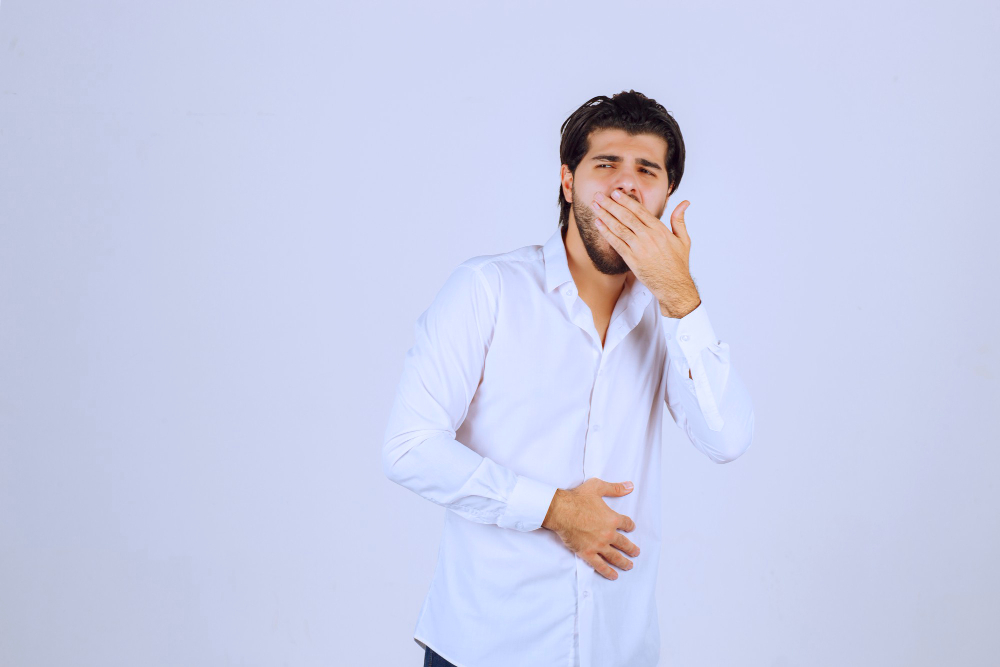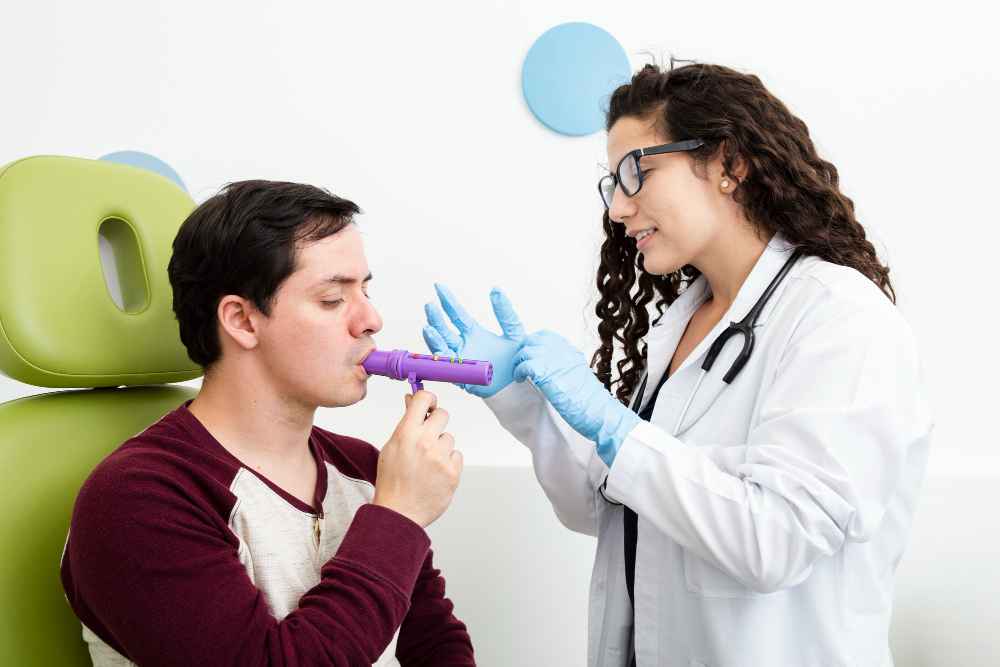Introduction: Understanding Bad Breath and Its Causes
What is Bad Breath?
Bad breath, or halitosis, is the unpleasant odor that comes from the mouth. It can affect anyone at any time. If you’re noticing a foul smell when you speak or exhale, you may be dealing with bad breath. The odor can vary from mild to severe, and it can affect your confidence in social settings. But don’t worry, bad breath treatment can help you get fresh breath back!
Common Causes of Bad Breath
Poor oral hygiene is the leading cause of bad breath. When food particles and bacteria remain in the mouth, they can cause a bad smell. Not brushing or flossing regularly leads to plaque buildup, which can cause gum disease and worsen bad breath. Dry mouth is another major cause. Saliva helps wash away food and bacteria, but when the mouth doesn’t produce enough, the result is bad breath.
Certain foods, like garlic and onions, can leave lingering odors. If you’re on a low-carb or high-protein diet, you might experience bad breath due to ketosis. Smoking and drinking alcohol also dry out the mouth and promote bacteria growth, both of which lead to bad breath. If you have persistent bad breath, it could be a sign of underlying health issues like sinus infections or digestive problems. If that’s the case, don’t wait—consult a healthcare professional and find the right bad breath treatment to fix it fast!
Why Bad Breath Treatment is Essential for Oral Health

The Importance of Addressing Bad Breath
Addressing bad breath is vital for your overall health and well-being. If left untreated, it can lead to persistent discomfort, embarrassment, and social isolation. Taking action with effective bad breath treatment not only improves your oral hygiene but also ensures you feel confident in everyday interactions. Whether it’s using mouthwash or visiting a dentist, addressing bad breath can prevent it from affecting your quality of life.
How Bad Breath Affects Your Social and Professional Life
Bad breath can have a significant impact on your social and professional life. In social situations, it can cause awkwardness, making it harder to engage in conversations or form connections with others. You may find yourself avoiding close interactions or feeling self-conscious. Professionally, bad breath can undermine your confidence and affect how others perceive you. Effective bad breath treatment is essential to maintain strong relationships, whether in personal settings or business environments. Don’t let bad breath hold you back—take control and regain your confidence.
Effective Bad Breath Treatment Options

Home Remedies for Bad Breath
There are several simple home remedies that can help combat bad breath. Drinking plenty of water throughout the day helps wash away food particles and bacteria, keeping your mouth fresh. Chewing sugar-free gum can stimulate saliva production, which naturally fights bad breath. Additionally, natural remedies like chewing parsley, fennel seeds, or mint can mask odors and promote fresh breath. A saltwater rinse is another effective option—gargling with warm salt water can help reduce bacteria and soothe the mouth. These home remedies are an excellent first step in your bad breath treatment routine.
Over-the-Counter Products for Fresh Breath
For quick relief, over-the-counter products are widely available and can be effective in treating bad breath. Mouthwashes designed for fresh breath can eliminate odor-causing bacteria and temporarily mask bad breath. Look for mouthwashes with antibacterial agents like chlorhexidine or acetyl pyridinium chloride for longer-lasting results. Breath sprays are another handy solution, offering immediate freshness. Toothpaste with added antibacterial ingredients, such as triclosan, can also help fight bad breath while brushing. These products are convenient and can be used alongside regular oral hygiene for an effective bad breath treatment.
Professional Dental Treatments for Bad Breath
If bad breath persists despite home remedies and over-the-counter products, it may be time to seek professional dental treatments. A dentist can identify any underlying dental issues like gum disease, cavities, or infections that may be contributing to bad breath. Regular professional cleanings can help remove plaque and tartar buildup, reducing the bacteria responsible for bad breath. In some cases, your dentist may recommend additional treatments, such as fluoride applications or antibacterial therapies, to target persistent odor. If bad breath is linked to more complex health issues, your dentist can refer you to a specialist for further evaluation. Professional treatment can ensure you address the root cause and get lasting relief.
Preventing Bad Breath: Long-Term Solutions

The Role of Proper Oral Hygiene in Bad Breath Treatment
Proper oral hygiene is key to preventing and treating bad breath. Brushing your teeth at least twice a day with fluoride toothpaste helps remove food particles and plaque that bacteria feed on, reducing odor. Don’t forget to brush your tongue, as it’s a common area where bacteria accumulate. Flossing daily is equally important, as it cleans between your teeth, where toothbrushes can’t reach. Using an antibacterial mouthwash can help kill the bacteria responsible for bad breath. A consistent oral hygiene routine is essential for effective bad breath treatment and long-term fresh breath.
Diet and Lifestyle Changes to Combat Bad Breath
Diet and lifestyle choices can have a significant impact on your breath. Avoiding foods like garlic, onions, and spicy dishes can help reduce bad breath, as these foods release sulfur compounds that linger in the mouth. Eating crunchy fruits and vegetables, like apples and carrots, can naturally clean teeth and stimulate saliva production, which helps prevent bad breath. Cutting back on alcohol and smoking is also crucial, as both dry out the mouth and contribute to bad breath. Staying hydrated and eating a balanced diet rich in fiber, vitamins, and minerals can improve your overall oral health and keep your breath fresh.
When to See a Dentist for Bad Breath Treatment
If home remedies and over-the-counter products aren’t working, it’s time to consult a dentist. Persistent bad breath may be a sign of an underlying dental issue, such as gum disease, tooth decay, or an infection that needs professional attention. A dentist can perform a thorough examination, clean your teeth, and provide treatments to address the root cause of your bad breath. If necessary, they may refer you to a specialist for further diagnosis. Seeking professional help is essential for effective bad breath treatment, especially if your breath issues are chronic or worsening. Don’t wait—seeing a dentist can help you get to the bottom of the problem and find a lasting solution.
Natural Bad Breath Treatment: Herbal and Holistic Approaches

Herbal Teas and Remedies for Fresh Breath
Herbal teas are an excellent natural remedy for fresh breath. Peppermint tea, in particular, is known for its refreshing flavor and ability to neutralize bad odors. It also has antibacterial properties that can help reduce the bacteria in your mouth that cause bad breath. Green tea is another great option, as it contains antioxidants that fight bacteria and promote overall oral health. Drinking a cup of chamomile tea can also help soothe the mouth and reduce inflammation, contributing to fresher breath. These herbal teas not only provide fresh breath but also support hydration, which is crucial in combating dry mouth, a common cause of bad breath.
Essential Oils and Their Role in Bad Breath Treatment
Essential oils play a significant role in bad breath treatment. Peppermint oil is widely recognized for its ability to freshen breath while providing a pleasant, minty taste. You can add a few drops to water or dilute it with a carrier oil and use it as a mouthwash to fight bacteria. Tea tree oil is another essential oil with powerful antibacterial properties that can help eliminate odor-causing bacteria. Clove oil, known for its ability to reduce gum inflammation, can also be helpful in combating bad breath. When used correctly, these essential oils not only mask bad breath but also address its root causes by targeting harmful bacteria in the mouth.
Bad Breath Treatment Myths: What You Need to Know

Common Misconceptions About Bad Breath
There are several misconceptions about bad breath that can prevent people from seeking the right treatment. One common myth is that bad breath only happens due to poor oral hygiene. While it’s true that oral care plays a significant role, bad breath can also be caused by health issues like sinus infections, digestive problems, or even certain medications. Another misconception is that chewing gum or using breath mints can fully eliminate bad breath. While they can temporarily mask the odor, they don’t address the underlying causes, such as bacteria buildup or dry mouth. It’s essential to understand that true bad breath treatment involves more than just masking the smell—it’s about addressing the root cause.
Debunking the Myths Around Fresh Breath Products
Many fresh breath products, such as mouthwashes or sprays, are marketed as quick fixes, but they don’t always live up to their promises. A common myth is that mouthwash can cure bad breath. While mouthwash can help freshen your breath temporarily, it doesn’t target the source of bad breath, like bacteria or gum disease. Some mouthwashes may even contain alcohol, which can dry out the mouth and potentially make bad breath worse. Similarly, breath sprays are only a short-term solution that doesn’t provide lasting results. For effective bad breath treatment, it’s important to combine proper oral hygiene, diet, and professional care rather than relying solely on over-the-counter products.
Conclusion: Achieving and Maintaining Fresh Breath
The Best Practices for Long-Lasting Fresh Breath
To keep your breath fresh, you need a consistent oral care routine. Brush your teeth twice a day with fluoride toothpaste and remember to clean your tongue. Floss daily to remove food particles and plaque between your teeth. Use an antibacterial mouthwash to kill odor-causing bacteria and keep your breath fresh. Drink water often to avoid dry mouth, a major cause of bad breath. Eating crunchy fruits and vegetables also helps clean your teeth and boosts saliva production.
How Consistency in Treatment Leads to Better Results
Consistency is crucial for lasting fresh breath. Brush and floss daily to prevent bacteria buildup. Visit your dentist regularly for cleanings and check-ups. Stick to a healthy diet, avoid sugary foods, and stay hydrated. With consistent care, you’ll see noticeable improvements in your breath and overall oral health. Keep up with these habits for long-term success.


